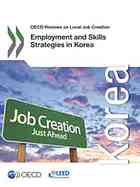
OECD Reviews on Local Job Creation Employment and Skills Strategies in Korea. PDF
Preview OECD Reviews on Local Job Creation Employment and Skills Strategies in Korea.
OECD Reviews on Local Job Creation O E C Employment and Skills Strategies in Korea D R e v ie The Local Job Creation series focuses on the role of employment and training agencies in contributing to job w OECD Reviews on Local Job Creation creation and productivity. It explores how OECD countries are implementing labour market and skills policy s o and putting measures in place at the local level to stimulate quality employment, inclusion and growth. n L o Employment and Skills c a Contents l J o Strategies in Korea b Executive summary C Reader’s guide re a Chapter 1. Policy context for employment and skills in Korea tio n Chapter 2. Overview of the Korean case study areas Chapter 3. Local job creation dashboard fi ndings in Korea Chapter 4. Towards an action plan for jobs in Korea: Recommendations and best practices a e E m p lo r y m e n t a n d S k o ills S t r a t e g ie s in K o K Consult this publication on line at http://dx.doi.org/10.1787/9789264216563-en. r e a This work is published on the OECD iLibrary, which gathers all OECD books, periodicals and statistical databases. Visit www.oecd-ilibrary.org for more information. ISBN 978-92-64-21655-6 9HSTCQE*cbgffg+ 84 2014 09 1 P OECD Reviews on Local Job Creation Employment and Skills Strategies in Korea ThisworkispublishedundertheresponsibilityoftheSecretary-GeneraloftheOECD.The opinionsexpressedandargumentsemployedhereindonotnecessarilyreflecttheofficial viewsofOECDmembercountries. This document and any map included herein are without prejudice to the status of or sovereigntyoveranyterritory,tothedelimitationofinternationalfrontiersandboundaries andtothenameofanyterritory,cityorarea. Pleasecitethispublicationas: OECD(2014),EmploymentandSkillsStrategiesinKorea,OECDReviewsonLocalJobCreation,OECD Publishing. http://dx.doi.org/10.1787/9789264216563-en ISBN978-92-64-21655-6(print) ISBN978-92-64-21656-3(PDF) ISBN (HTML) Series/Periodical:OECDReviewsonLocalJobCreation ISSN2311-2328(print) ISSN2311-2336(online) ThestatisticaldataforIsraelaresuppliedbyandundertheresponsibilityofthe relevantIsraeliauthorities.Theuse ofsuchdatabytheOECDiswithoutprejudicetothestatusoftheGolanHeights,EastJerusalemandIsraeli settlementsintheWestBankunderthetermsofinternationallaw. Photocredits:Cover©AndyDeanPhotography/Shutterstock.com,©iStockphoto.com/uschools. CorrigendatoOECDpublicationsmaybefoundonlineat:www.oecd.org/about/publishing/corrigenda.htm. ©OECD2014 Youcancopy,downloadorprintOECDcontentforyourownuse,andyoucanincludeexcerptsfromOECDpublications,databasesand multimediaproductsinyourowndocuments,presentations,blogs,websitesandteachingmaterials,providedthatsuitable acknowledgmentofthesourceandcopyrightownerisgiven.Allrequestsforpublicorcommercialuseandtranslationrightsshouldbe submittedtorights@oecd.org.Requestsforpermissiontophotocopyportionsofthismaterialforpublicorcommercialuseshallbe addresseddirectlytotheCopyrightClearanceCenter(CCC)[email protected]çaisd'exploitationdudroitdecopie (CFC)[email protected]. PREFACE Preface A cross the OECD, policy makers are grappling with a critical question: how to create jobs?The recent financial crisis and economic downturn has had serious consequences across most OECD countries, with rising unemployment rates and jobs being lost across many sectors. Indeed, for some countries, the effects the downturn brought with it are continuing,ifnotamplifying.Shrinkingpublicbudgetsinsomecountriesalsomeanthat policymakersmustnowdomorewithless.Inthiscontext,itisnecessarytothinklaterally abouthowactionsinonearea,suchasemploymentandtraining,canhavesimultaneous benefits in others, such as creating new jobs and better supporting labour market inclusion. Over recent years, the work of the OECD LEED Programme on Designing Local Skills Strategies,BuildingFlexibilityandAccountabilityintoLocalEmploymentServices,Breakingoutof Policy Silos, LeveragingTraining and Skills Development in SMEs, and Skills for Competitiveness has demonstrated that local strategies to boost skills and job creation require the participation of many different actors across employment, training, economic development, and social welfare portfolios. Employers, unions and the non-profit sector are also key partners in ensuring that education and training programmes provide the skillsneededinthelabourmarketsoftodayandthefuture. The OECD Reviews on Local Job Creation deliver evidence-based and practical recommendations on how to better support employment and economic development at thelocallevel.Thisreportbuildsonsub-nationaldataanalysisandinterviewswithlocal stakeholdersintwocasestudies.Itprovidesacomparativeframeworktounderstandthe roleofthelocallevelincontributingtomoreandbetterqualityjobs.Thereportcanhelp national, regional and local policy makers in Korea build effective and sustainable partnershipsatthelocallevel,whichjoin-upeffortsandachievestrongeroutcomesacross employment, training, and economic development policies. Co-ordinated place-based policiescanhelpworkersfindsuitablejobs,whilealsostimulatingentrepreneurshipand productivity,whichincreasesthequalityoflifeandprosperitywithinalocalcommunity. IwouldliketowarmlythanktheKoreanMinistryofEmploymentandLaborfortheir activeparticipationandsupportofthestudy. SergioArzeni, Director,OECDCentreforEntrepreneurship, SMEsandLocalDevelopment EMPLOYMENTANDSKILLSSTRATEGIESINKOREA©OECD2014 3 ACKNOWLEDGEMENTS Acknowledgements T his report has been written by the Local Economic and Employment Development (LEED) Programme of the Organisation for Economic Co-operation and Development (OECD) as part a project undertaken in co-operation with the Korean Ministry of Employment and Labor.The review is part of the programme of work of the OECD LEED DivisionundertheleadershipofSylvainGiguère. TheprincipalauthorsareJonathanBarr(PolicyAnalyst,OECD);EmmaClarence(Policy Analyst, OECD); and Myung-Sook Jun (Professor, Chonnam National University). The authors would like to thank Francesca Froy (Senior Policy Analyst, OECD) who provided valuablecommentsonthisreport,MichelaMeghnagiforherworkonthedataanalysis,as well as Elisa Campestrin, François Iglesias, MalikaTaberkane and other colleagues in the OECDLEEDProgrammefortheirassistancewiththisreport. The authors would also like to acknowledge the valuable contributions of Kyungsoo ChoioftheKoreanDevelopmentInstituteandJohnBuchananoftheUniversityofSydney, Australia,fortheirparticipationontheprojectstudyvisitandcontributionstothisreport. Finally,specialthanksshouldbegiventotherepresentativesfromthestateandlocal authorities and institutions who participated in meetings and provided documentation andcommentscriticaltotheproductionofthereport. 4 EMPLOYMENTANDSKILLSSTRATEGIESINKOREA©OECD2014 TABLEOFCONTENTS Table of contents Acronymsandabbreviations................................................. 7 Executivesummary......................................................... 9 Reader’sguide ............................................................. 11 Chapter1.PolicycontextforemploymentandskillsinKorea..................... 15 Overview .............................................................. 16 TheAsianfinancialcrisisandKorea’sjoblessrecovery ....................... 17 Facinganewcrisis:on-goingchallenges ................................... 18 Summaryofinstitutionalarrangements.................................... 20 Koreanlabourmarketpolicies:Theinstitutionalframework .................. 21 Korea’svocationaleducationandtrainingsystem ........................... 28 Economicdevelopmentpoliciesandprogrammes ........................... 31 References ............................................................. 32 Chapter2.OverviewoftheKoreancasestudyareas............................. 35 Overview .............................................................. 36 Bucheon............................................................... 36 Busan ................................................................. 37 Comparisonacrossthecasestudyareas.................................... 38 Thebalancebetweenskillssupplyanddemandatthesub-nationallevel ...... 39 References ............................................................. 40 Chapter3.LocaljobcreationdashboardfindingsinKorea........................ 43 Overviewofresultsfromthelocaljobcreationdashboard .................... 44 Theme1:Betteraligningpolicyandprogrammestolocaleconomicdevelopment 44 Theme2:Addingvaluethroughskills...................................... 50 Theme3:Targetingpolicytolocalemploymentsectorsandinvesting inqualityjobs ....................................................... 54 Theme4:Beinginclusive................................................. 58 References ............................................................. 62 Chapter4.TowardsanactionplanforjobsinKorea: Recommendationsandbestpractices..................................... 65 Betteraligningpoliciesandprogrammestolocaleconomicdevelopment....... 66 Addingvaluethroughskills .............................................. 70 Targetingpolicytolocalemploymentsectorsandinvestinginqualityjobs...... 74 Beinginclusive ......................................................... 78 References ............................................................. 80 EMPLOYMENTANDSKILLSSTRATEGIESINKOREA©OECD2014 5 TABLEOFCONTENTS Tables 1.1. AnnualGRDPandemploymentgrowthbyregion......................... 32 2.1. Bucheon:Labourforcecharacteristics .................................. 36 2.2. Employmentindicatorsacrossthecasestudyareas,2012 ................. 38 2.3. Employmentbyindustry,2010......................................... 39 Figures 1.1. Shareofpopulationbyprovince,2012 .................................. 16 1.2. TrendsofGDPgrowthinKorea1995-2012 ............................... 17 1.3. GrossdomesticexpenditureinR&D,2001-10 ............................ 18 1.4. Unemploymentrate,KoreaandOECDaverage,2000-12 ................... 19 1.5. Summaryofinstitutionalarrangementsforemployment,training, andeconomicdevelopmentpolicies.................................... 20 1.6. Percentageofemploymentspendingonactivelabourmarketpolicies andprogrammes,KoreaversusselectedOECDcountries,2011............. 21 1.7. Percentageofactivelabourmarketspendingondirectjobcreationmeasures, Korea,2002-11....................................................... 22 2.1. Understandingtherelationshipbetweenskillssupplyanddemand ........ 39 2.2. Skillssupplyanddemand,Korea,2010 ................................. 40 3.1. LocaljobcreationdashboardforKorea ................................. 44 3.2. Dashboardfindingsforbetteraligningpoliciesandprogrammestolocal economicdevelopment............................................... 45 3.3. Inyouropinion,whatflexibilitydoyouhaveinhowyouimplement thefollowingaspectsofyourwork?.................................... 47 3.4. Doesyourorganisationhavesufficientfundsandqualifiedstafftoachieve itsgoals? ........................................................... 48 3.5. Dashboardresultsforaddingvaluethroughskills........................ 51 3.6. Targetingpolicytolocalemploymentsectorsandinvestinginqualityjobs .. 55 3.7. Dashboardresultsforinclusion........................................ 59 3.8. Women’slabourforceparticipationrateinselectedOECDcountries,2012 ... 60 Follow OECD Publications on: http://twitter.com/OECD_Pubs http://www.facebook.com/OECDPublications http://www.linkedin.com/groups/OECD-Publications-4645871 http://www.youtube.com/oecdilibrary OECD Alerts http://www.oecd.org/oecddirect/ 6 EMPLOYMENTANDSKILLSSTRATEGIESINKOREA©OECD2014 ACRONYMSANDABBREVIATIONS Acronyms and abbreviations AFC AsianFinancialCrisis BIPF BucheonIndustryPromotionFoundation DMZ DigitalMediaZone EIS EmploymentInsuranceSystem GRDP GrossRegionalDomesticProduct HRD HumanResourcesDevelopment HRDS HumanResourcesDevelopmentService IAP IndividualActivityPlan IBC InternationalBusinessCentre ITAs IndividualTrainingAccounts KEDI KoreanEducationDevelopmentInstitute KSAT KoreanScholasticAptitudeTest MEST MinistryofEducation,ScienceandTechnology MOEL MinistryofEmploymentandLabor MoGEF MinistryofGenderEqualityandFamily MoHW MinistryofHealthandWelfare MoPAS MinistryofPublicAdministrationandSecurity MoSF MinistryofStrategyandFinance MOU MemorandumofUnderstanding OECD OrganisationforEconomicCo-operationandDevelopment PCRD PresidentialCommitteeonRegionalDevelopment PES PublicEmploymentServices PIAAC ProgrammefortheInternationalAssessmentofAdultCompetencies R&D ResearchandDevelopment RAC Re-employmentAssistanceCentre UEC UrbanEntertainmentCentre VET Vocationaleducationandtraining EMPLOYMENTANDSKILLSSTRATEGIESINKOREA©OECD2014 7
